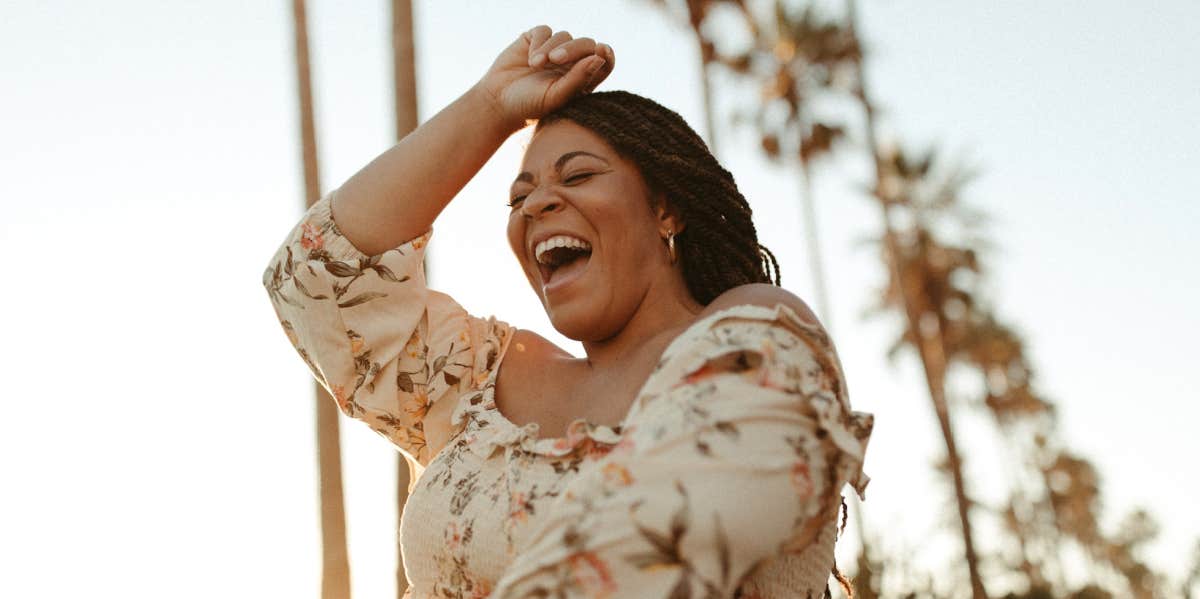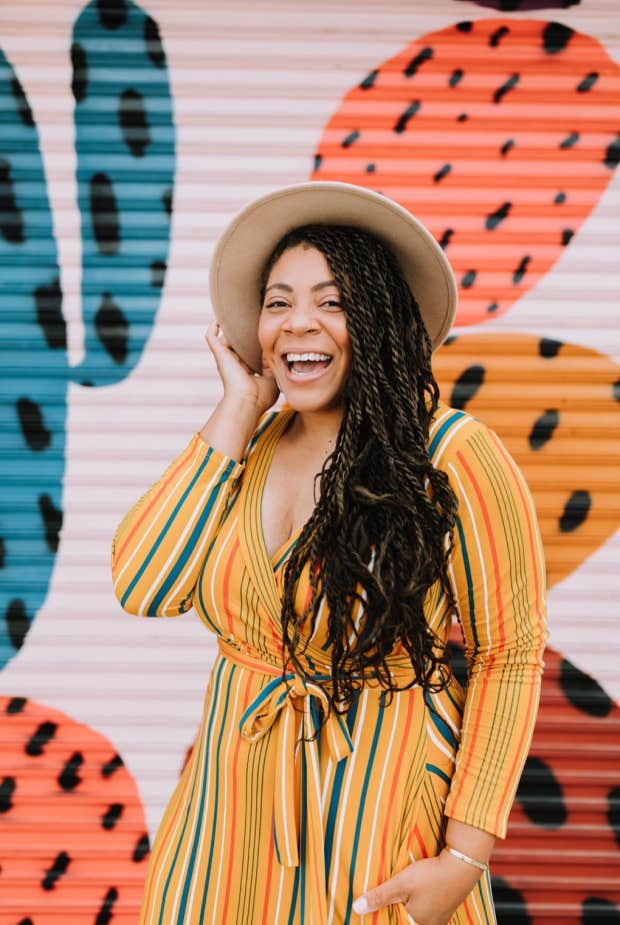Arielle Estoria Gets Real About What It Takes To (Finally!) Find Authentic Friendships
She's redefining friendship goals.
 courtesy of Arielle Estoria
courtesy of Arielle Estoria I’m a friendly person. Chatting with anyone and everyone comes naturally to me.
But it’s hard for me to make friends — real friends.
I feel like I always hold something back or like I have to perform a type of personality that isn’t very authentic in order to be liked. I hate inauthenticity, so I tend to just pull back.
That’s why I was so completely taken by influencer Arielle Estoria’s Instagram post about “permission slip people".
She writes, “They are the people that you meet and you find that all of you, even the hidden and unknown parts of you... exhale. All of you sigh because you are safe.
Because you are not crazy. Because you are right on track, not off path but directly on it.”
It’s hard to explain what a relief it is for someone like me, who isn’t great at going with the flow or fitting in, to see that others have felt this way.
Estoria, who describes herself as “a Spoken Word Poet, Author and Speaker through words that can't only be heard but demand to be felt and experienced” has found a passionate audience on Instagram, with almost 80,000 engaged followers.
She shares what she calls "Words not for the ears but for the soul".
Her memes, which often feature her voice reading the words — somehow both gentle and strong — are often about letting go of others’ expectations of you and accepting yourself wholly.
Exactly what I, and so many people like me, need to hear.
 Photo courtesy of Arielle Estoria
Photo courtesy of Arielle Estoria
I asked Arielle if it was hard for her to find permission slip people.
Her answer surprised me at first, but as her words settled in and I started to understand the ways in which timing plays into this, they made perfect sense.
“It wasn't necessarily that it was hard,” she told me, “it was more so that it took me a long time to realize that my permission slip friends came in a season of personal change and growth.”
This makes sense to me. After all, when everything is going well and you feel great about yourself, relationships can feel simpler and easier.
Maybe you don’t need that deeper, more honest friendship. Maybe you don’t need accountability or someone who knows how to hold space for your complex self.
“It was in the midst of that change and growth that I started to feel alone and ostracized mentally and spiritually from in some of my communities that fit who I was — but not who I was becoming,” she explained.
“Once I started to be honest with myself about those changes, the permission slip friendships came thereafter. They were birthed out of being honest with myself and giving others to be the same with me.”
Yes! After all, we aren’t like static puzzle pieces, as full, complex human beings. There isn’t just one place we will fit throughout our lives.
We will grow and change, and fit differently and have different needs as we change and grow.
“The foundation of [my friendships] became raw, authentic honesty and that's also the gift we give to each other in the friendship as well,” she said.
The truth is, forming deep, unconditional friendships gets harder for a lot of women as we get older.
In high school and your early twenties, it feels easy to become besties with someone, especially if you’re both single and like going to bars and clubs to meet people, or maybe if you work or go to school together.
But that changes as you reach your thirties and start to figure out who you really are — at least for me it did.
I found myself uncomfortable with the way so many groups of women seemed to talk negatively about their bodies and took part in crash diets and “fasts” in order to lose weight.
I had battled a disordered relationship with eating and my body throughout my life and the fatphobia and self-harm that I witnessed from other women was not going to work for me. I needed something different.
I don’t blame them for their own discomfort with their bodies, as it’s hard to grow up in the USA without being affected by a culture that tells us our bodies are never good enough. But for me, those friendships weren’t healthy.
I also tend to be incredibly opinionated and very political and that doesn’t always make a person popular!
But trying to keep things like this inside made me feel like a total fraud, while speaking up about them made me feel like a jerk.
All of this reminds me of another quote from Arielle’s Instagram, which has been liked more than 5000 times:
It reads:
"You are not the person I thought you were," She said.
I inhaled and released the most freeing response, "I am sorry that you had a perception and expectation of me that you created that I don't meet."
The next slide reads:
And then gently, I whispered an apology back to myself "and I'm sorry you believed you had to meet them in the first place."
What if instead of trying to meet others’ expectations of us, we stopped giving validity to others’ expectations in the first place?
In pushing away from the friendships that made me feel like I simply didn’t fit, perhaps I was creating a space for something different to grow.
Fortunately, I do have a few “permission slip” friends. My closest friend, Rebekkah, and I met years ago, when our kids were tiny. As they grew up, we connected more deeply.
We have real conversations about everything: politics, inequality, books, and the challenge of building healthy relationships.
I can say things everyone else would’ve thought were crazy or extreme, and she just gets what I am trying to say.
The pandemic, our teenagers’ changing interests, and our changing work schedules has kept us from hanging out, but when we see each other or get on the phone, it’s like old times. I always walk away feeling like there’s someone out there who gets me.
I asked Arielle how to best maintain friendships with your permission slip people.
Here’s what she said:
"These friendships, specifically permission slip friendships, are exactly that: permissions to be as you are and come as you are, messy, unprepared, sometimes chaotic and unable to show up especially in seasons like now."
She told me that friendships like this begin with honesty with ourselves, “and then the space to be honest with each other — coming back to that continuously when things get stagnant or stale is vital.”
One of the benefits of these friendships is that you can spend time together and feel good afterward.
“It also is so refreshing when you can walk away from these encounters where both parties feel filled and seen,” she told me.
“Permission slip friendships are not one-way spaces — they are always two-way.”
Having someone who “gets you” is also one of the beauties of social media.
Yeah, there are people who use social media to do a lot of harm, but in the chaos I have found some of the most beautiful, inspiring women on Instagram and Twitter.
There's always so much wisdom out there. Like with her little video, below.
Finding influencers who speak to you, who tell you the things you need to hear or inspire you to do good for the world, is a gift.
Social media may seem shallow or unimportant or maybe even woo-ish, but this is a community of women helping one another and inspiring each other, even when we don’t know each other — and that is beautiful.
And thanks to women like Arielle Estoria, we are given the inspiration (and permission) to be more authentic to ourselves. For that, I'm eternally grateful.
Joanna Schroeder is a feminist writer and media critic with a degree in gender studies from UCLA. Her writing has appeared in The New York Times, Time, Redbook, Cosmopolitan, BuzzFeed, Esquire, Vox, and more. Follow her on Twitter for more.

